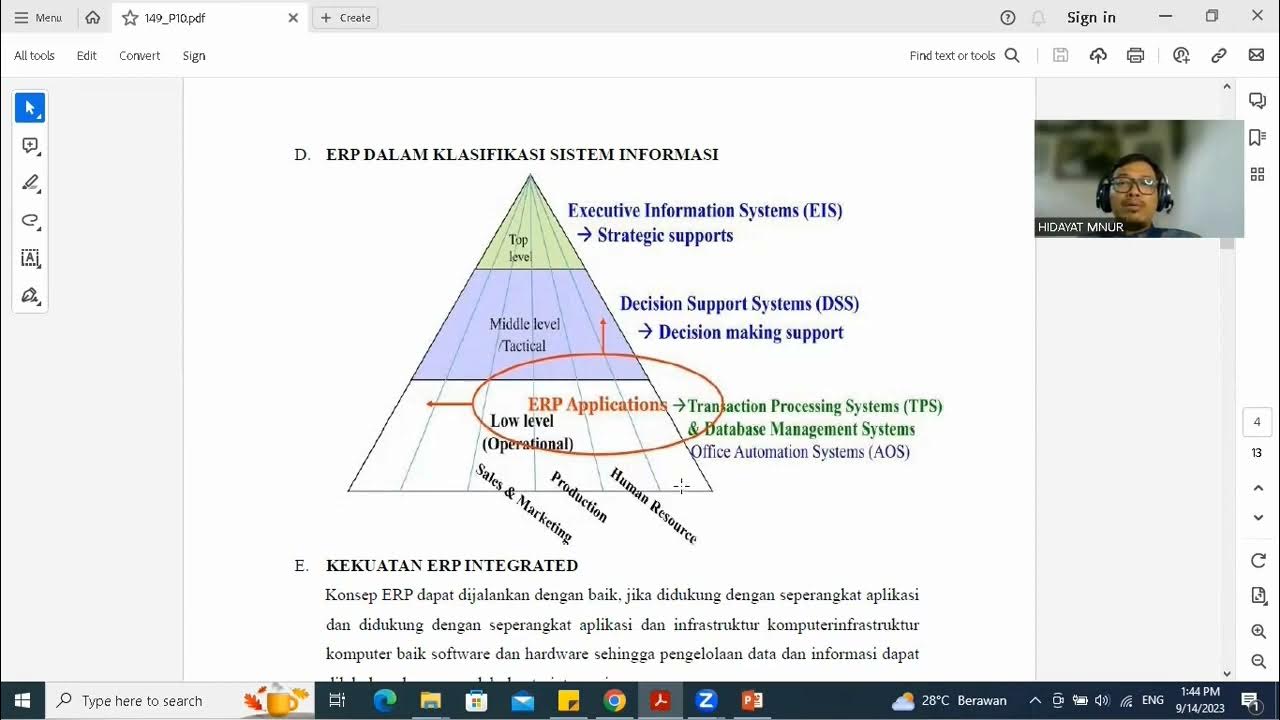Implementing a New ERP System
Summary
TLDRImplementing an Enterprise Resource Planning (ERP) system is essential for enhancing efficiency and competitiveness in organizations. However, the transition poses significant challenges, including cost and schedule overruns, and often falls short of expected benefits. Successful implementation requires careful planning across key phases: process assessment, data migration, pilot testing, training, final deployment, and ongoing evaluation. Impress supports organizations by documenting current processes, visualizing workflows, and facilitating employee understanding of new roles. By prioritizing these strategies, businesses can maximize their ERP investment and achieve sustainable operational improvements.
Takeaways
- 😀 ERP systems like Cisco, Oracle, and SAP help businesses improve efficiency and competitiveness by providing cross-functional process integration.
- 💰 Implementing an ERP system requires significant upfront investment and time, with no guaranteed immediate return on investment.
- ⚠️ A 2013 study revealed that 53% of ERP projects experience cost overruns and 61% face schedule overruns.
- 🔍 Understanding the phases of ERP implementation is crucial for success, similar to managing any high-cost, high-risk project.
- 📈 Effective process assessment is vital; organizations should identify gaps between existing processes and ERP functionalities.
- 🔧 Instead of heavily customizing the ERP, consider re-engineering existing processes to align with the system.
- 📅 Develop a realistic timetable for migrating current data, which may include manual data entry.
- 🔬 Conduct rigorous pilot testing to mitigate risks before full-scale deployment of the ERP system.
- 👩🏫 Training employees on the new system and processes should be prioritized to ensure a smooth transition.
- 📝 Regular evaluation of the ERP system is essential to prepare for upgrades and ensure ongoing efficiency.
Q & A
What are the primary benefits of implementing an ERP system?
-ERP systems help businesses improve efficiency and competitiveness by providing cross-functional process integration, maintaining centralized customer and financial data, shortening business process cycles, increasing user productivity, and enhancing customer service, which can ultimately lead to higher profits.
What challenges are commonly faced during ERP implementation?
-Challenges include cost overruns, schedule delays, and underperformance in terms of expected benefits. According to a 2013 study, 53% of projects faced cost overruns, 61% had schedule overruns, and 60% of respondents received less than half of the anticipated benefits.
Why is change management crucial in ERP implementation?
-Change management is critical because the success of an ERP project often hinges on adapting processes, culture, and systems within the organization. Properly managing these changes helps ensure a smoother transition and better outcomes.
What role does process assessment play in ERP implementation?
-Process assessment helps organizations document their current processes, understand how they function, identify gaps in ERP functionality, and plan for necessary changes. It is a key step in aligning the ERP system with specific business requirements.
How does Impress support organizations during ERP implementation?
-Impress offers support during the critical phases of implementation by helping organizations document their current processes, envision how the new ERP will fit in, and train employees on new processes using its secure web-based platform.
What is the importance of pilot testing in ERP implementation?
-Pilot testing is vital for mitigating risks associated with ERP implementation. It allows organizations to rigorously test the new system before full deployment, ensuring that issues can be addressed and workflows validated.
How can businesses prepare for data migration during ERP implementation?
-Preparing for data migration involves creating a realistic timetable for migrating current data or manually entering it into the new system. This is essential for ensuring long-term success and minimizing disruptions during the transition.
What are some key considerations when documenting current business processes?
-When documenting current processes, it’s important to capture them as they currently function, categorize process steps by responsibility, and identify existing legacy systems. This accurate documentation serves as a foundation for effective ERP integration.
What benefits arise from clearly mapping current and new processes?
-Clearly mapping processes allows organizations to visualize workflows, identify areas for automation, standardize data collection, reduce errors, and ensure compliance with regulations. It facilitates a better understanding of how the ERP will be integrated.
How does regular evaluation of ERP systems contribute to organizational success?
-Regular evaluation of ERP systems helps organizations prepare for upgrades and assess whether the system continues to meet business needs. This proactive approach can prevent costly issues and enhance overall system effectiveness.
Outlines

This section is available to paid users only. Please upgrade to access this part.
Upgrade NowMindmap

This section is available to paid users only. Please upgrade to access this part.
Upgrade NowKeywords

This section is available to paid users only. Please upgrade to access this part.
Upgrade NowHighlights

This section is available to paid users only. Please upgrade to access this part.
Upgrade NowTranscripts

This section is available to paid users only. Please upgrade to access this part.
Upgrade NowBrowse More Related Video
5.0 / 5 (0 votes)





